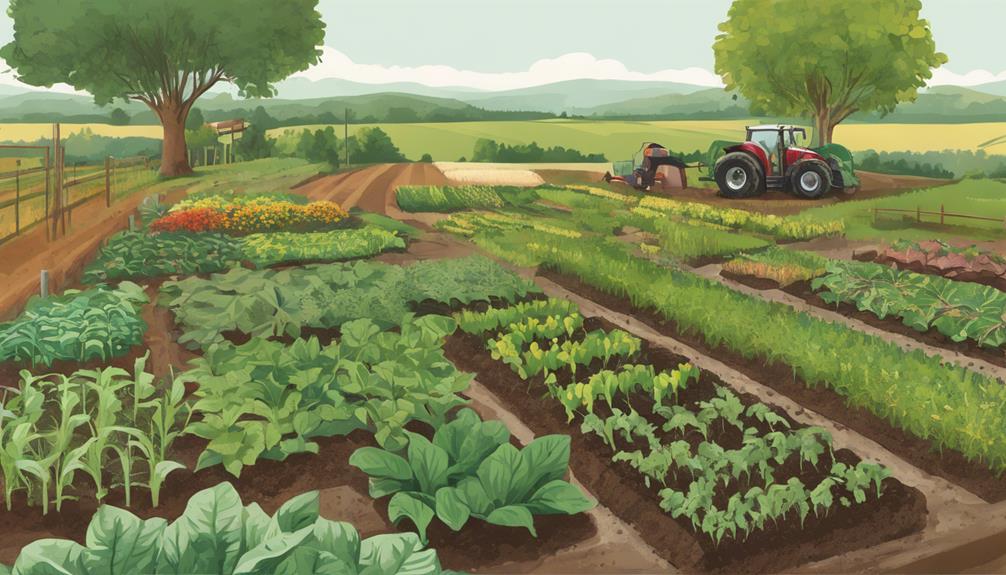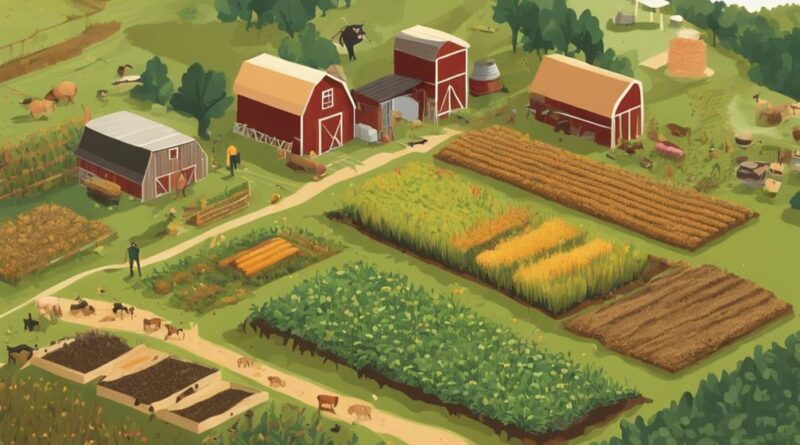Boosting Sustainability With Natural Farming Methods
Boost sustainability with natural farming methods by utilizing organic practices, enhancing soil health, conserving water, promoting biodiversity, managing pests, controlling diseases, reducing carbon footprint, and engaging with the community. These methods bolster ecosystem resilience, crop quality, and resource efficiency. Embracing sustainable farming not only benefits the environment but also supports economic growth and community well-being. By incorporating these innovative practices, you can pave the way for a greener future and contribute to lasting agricultural sustainability.
Importance of Sustainable Farming
Embracing sustainable farming practices not only preserves natural resources but also enhances crop resilience and ecosystem health. The benefits of sustainable farming are vast and crucial for the future trends in agriculture. By utilizing sustainable farming methods, you're contributing to the preservation of soil quality, water resources, and biodiversity.
One of the key benefits of sustainable farming is the improvement in soil health. Sustainable practices such as crop rotation, cover cropping, and reduced tillage help maintain soil structure, increase organic matter content, and promote beneficial soil microbial activity. This leads to enhanced nutrient cycling, water retention, and overall soil fertility, ensuring the long-term productivity of farmland.
Furthermore, sustainable farming plays a vital role in enhancing crop resilience to environmental stresses. Diversified cropping systems and integrated pest management strategies help reduce the reliance on chemical inputs, thereby minimizing the risk of pest resistance and chemical runoff. This resilience is essential for adapting to the changing climate and ensuring stable food production in the face of unpredictable weather patterns.
Benefits of Organic Practices
Implementing organic practices in agriculture results in improved soil health and enhanced crop quality through natural methods that prioritize sustainability over chemical intervention. By avoiding synthetic pesticides and fertilizers, organic farming promotes soil biodiversity, leading to improved nutrition in crops. Research shows that organically grown fruits and vegetables have higher levels of antioxidants and essential nutrients, offering consumers a healthier choice.
Furthermore, organic practices contribute to environmental protection by reducing pollution of soil, water, and air. The absence of harmful chemicals in organic farming helps maintain ecosystem balance and supports the health of pollinators crucial for crop production. This approach not only benefits the environment but also safeguards human health by minimizing exposure to toxic substances present in conventional farming practices.
Organic farming methods such as crop rotation, composting, and biological pest control promote sustainable agriculture by enhancing soil fertility and natural pest resistance. These practices not only ensure long-term productivity but also reduce the reliance on external inputs, making farming more cost-effective and resilient to external market fluctuations. By prioritizing soil health and biodiversity, organic practices pave the way for a more sustainable and nourishing food system that benefits both present and future generations.
Soil Health and Fertility
Enhancing soil health and fertility is essential for sustainable agricultural practices. Soil serves as the foundation for crop production, impacting yields and overall plant nutrition. By implementing natural farming methods, you can significantly improve soil quality, leading to increased productivity and nutritional value in your crops.
One way to enhance soil health is through the use of cover crops. Cover crops help prevent soil erosion, improve water retention, and add organic matter to the soil, ultimately boosting its fertility. Additionally, cover crops can increase beneficial soil microorganisms, which play a crucial role in nutrient cycling and overall soil health.
Incorporating organic fertilizers and compost into your farming practices can also have a profound impact on soil fertility. These natural amendments provide essential nutrients to the soil, promoting healthy plant growth and improving yields. Furthermore, organic fertilizers help maintain soil structure, preventing compaction and erosion.
To further improve soil health, consider implementing crop rotation and intercropping techniques. These methods help break pest and disease cycles, enhance nutrient availability, and promote biodiversity in the soil. By diversifying your crops and planting strategies, you can create a more resilient and fertile soil ecosystem, ultimately leading to improved yields and enhanced nutrition in your produce.
Water Conservation Techniques
To optimize water usage in agricultural practices, employing efficient irrigation methods is crucial for sustainable resource management. Drip irrigation systems, a type of micro-irrigation that delivers water directly to the base of plants, are a key technology for water conservation in farming. These systems reduce water wastage significantly by minimizing evaporation and runoff compared to traditional surface irrigation methods.
Rainwater harvesting is another effective technique to enhance water conservation on farms. By collecting and storing rainwater for later use in irrigation, farmers can reduce their reliance on freshwater sources, especially during dry seasons. This method not only helps in conserving water but also reduces the energy costs associated with pumping water from distant sources.
Innovative farming practices like aquaponics integrate aquaculture with hydroponic cultivation, creating a symbiotic ecosystem where fish waste provides nutrients for plant growth. This closed-loop system minimizes water loss as the same water is recirculated between the fish tanks and plant beds, promoting efficient water use.
Greywater recycling involves treating household wastewater to remove contaminants for reuse in irrigation. By repurposing greywater from sinks, showers, and laundry, farmers can supplement their irrigation needs with recycled water, reducing the demand on freshwater sources and promoting sustainability in agriculture.
Biodiversity Promotion
Maximizing biodiversity within agricultural ecosystems is key to fostering resilience and sustainability in farming practices. By promoting a diverse range of species, you can enhance ecosystem support and create wildlife habitats within your farm. Here are some key strategies to boost biodiversity:
- Crop Diversity: Introducing a variety of crops helps maintain a healthy balance within the ecosystem. Different plants attract various insects and animals, contributing to a more robust and dynamic environment. Additionally, diverse crops can improve soil health, reduce the risk of pests and diseases, and enhance overall productivity.
- Pollinator Protection: Protecting pollinators such as bees and butterflies is crucial for ensuring successful crop production. By planting flowering plants and avoiding the use of harmful pesticides, you can create a welcoming environment for these essential pollinators. Enhancing pollinator populations not only benefits your farm but also supports the broader ecosystem.
- Wildlife Habitat: Designating areas within your farm as wildlife habitats can provide shelter, food, and breeding grounds for a wide range of species. By incorporating natural elements like hedgerows, ponds, and native vegetation, you can attract beneficial predators, birds, and other wildlife that contribute to pest control and ecosystem balance.
Implementing these biodiversity-promoting practices can't only improve the health and resilience of your farm but also contribute to the conservation of natural ecosystems.
Pest and Disease Management
Utilize integrated pest management techniques to effectively control pests and diseases in agricultural systems. Integrated pest management (IPM) combines various strategies to manage pests in a holistic and sustainable manner. By integrating techniques such as biological control, crop rotation, and the limited and targeted use of pesticides, farmers can effectively reduce pest populations while minimizing the impact on the environment.
In IPM, the focus isn't solely on eradicating pests but on managing them below levels that cause economic damage. By monitoring pest populations and employing a combination of cultural, biological, and mechanical control methods, farmers can disrupt the pest's life cycle and prevent widespread infestations. This approach not only reduces the reliance on chemical pesticides but also promotes the natural predators of pests, creating a more balanced and resilient ecosystem.
Holistic disease management is another crucial aspect of maintaining healthy agricultural systems. By implementing practices such as crop rotation, using disease-resistant varieties, and practicing good sanitation, farmers can reduce the spread of diseases and minimize the need for chemical interventions. Additionally, promoting soil health through practices like composting and cover cropping can enhance the plant's immune system, making them more resistant to diseases.
Carbon Footprint Reduction

Implementing sustainable farming practices can significantly reduce the carbon footprint of agricultural operations. By incorporating eco-friendly practices into your farming methods, you can effectively lower greenhouse gas emissions and mitigate the environmental impact associated with traditional farming practices.
Here are some key strategies to help you reduce your carbon footprint:
- Utilize Cover Crops: Introducing cover crops into your farming rotation can help sequester carbon in the soil, reducing the amount of carbon dioxide released into the atmosphere. Cover crops also improve soil health and water retention, contributing to sustainable agriculture practices.
- Adopt Precision Agriculture Techniques: Implementing precision agriculture techniques such as GPS-guided machinery and data analytics can optimize resource usage, leading to more efficient farming practices. By reducing inputs like water, fertilizers, and pesticides, you can lower your carbon footprint while maintaining or even increasing crop yields.
- Implement Agroforestry Systems: Integrating trees and shrubs into your farming landscape through agroforestry systems can enhance biodiversity, sequester carbon, and provide additional income streams. Agroforestry systems not only reduce greenhouse gas emissions but also contribute to sustainable agriculture by promoting ecosystem resilience and soil health.
Community and Economic Impact
Enhancing community well-being and fostering economic growth are pivotal outcomes of integrating sustainable farming practices into agricultural operations. Community engagement plays a significant role in the success of natural farming methods. By involving local residents in the farming process, whether through educational programs, volunteer opportunities, or farmers' markets, a sense of ownership and pride is instilled within the community. This engagement not only raises awareness about sustainable practices but also strengthens the bond between farmers and consumers.
Local markets are essential components of the economic impact of natural farming. By selling produce directly to consumers, farmers can eliminate the need for intermediaries, thus increasing their profits. Additionally, supporting local markets helps keep money within the community, leading to economic growth and stability. Studies have shown that communities with thriving local markets experience lower unemployment rates and higher disposable incomes.
Furthermore, the economic impact extends beyond the farmers themselves. As sustainable farming practices gain traction, new job opportunities are created in related industries such as organic food processing, eco-friendly packaging, and agritourism. This diversification of the local economy not only boosts employment rates but also attracts investment and innovation. In conclusion, integrating natural farming methods not only benefits the environment but also plays a vital role in enhancing community well-being and fostering economic growth.
Conclusion
In conclusion, embracing natural farming methods is crucial for boosting sustainability in agriculture. By implementing organic practices, promoting biodiversity, and reducing carbon footprints, farmers can enhance soil health, conserve water, and manage pests effectively. These methods not only benefit the environment but also have positive impacts on communities and economies.
Embracing sustainable farming practices is essential for a healthier, more resilient food system in the future.
